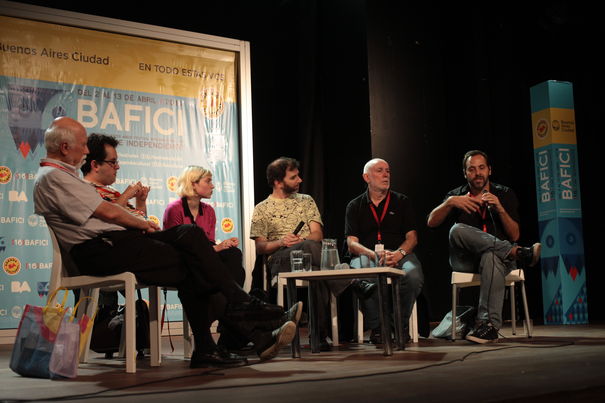The state of film criticism in Latin America
Yuraima Herrera of the Talent Press 2014, reports from the panel "The state of film criticism in Latin America, with this year critics Diego Lerer, Diego Battle and Quintín

Isaac León, Perú, Iván Pinto, Chile, Luciana Calcagno, Arg, Diego Battle, Arg, Diego Lerer, Arg and Quintín, Arg
Talent Press conference: State of film criticism in Latin America By Yuraima Herrera
The Talent Press conference State of film criticism in Latin America presented some of the referents of diverse practices of film criticism: Luciana Calcagno (Argentina), Diego Lerer (Argentina), Eduardo Antin “Quintín” (Argentina), Diego Lerer (Argentina), Iván Pinto (Chile), Isaac León “Chacho” Frías (Perú). Film critic and moderator Diego Battle triggered the question of whether film criticism is currently in tune or is simply accompanying the moment of growth of Latin American cinema in general. To tackle this issue, Frías presented a brief overview on the expansion of Peruvian cinema, which has incremented its number of spectators and productions in the last years. There has been as well a rising interest of the young generations to join this profession and all of this has made more room for film festivals, blogs, film curators and new film criticism. Yet, there is a lack of connection among these, which is evident in the lack of clarity of some critics to forge a tradition that reflects on cinema. Pinto talked about the growth of Chilean productions, in quality and also in number. This has produced, at the same time, a tacit alliance of films with criticism. Critics have identified themselves with this breakup with the past generation but have preserved a fundamental autonomous place. As an example Pinto mentioned La Fuga, the online magazine he directs, which aims to generate discussions on what is happening in Chilean cinema, fueled by political, social and cultural matters, in order to produce an spectator who can reflect on more complex issues and who considers other disciplines that interact with cinema. As regards the youngest generations he pointed out that there are “people writing”, but he considers that there is not a lot of profound criticism, which is why he has created a blog in order to encourage young critics. Quintín considered positive the appearance of different publications on the state of other countries’ cinema. He pointed out that Argentinean filmmakers are not considering conceptual work, and that they aspire to abolish criticism or even to do the job themselves. He observed that there is possibly a state of anger in film culture in general that is not being channeled, and there has also been a disagreement among critics of magazines, blogs, etc. That is the case of academic criticism, which should converge in BAFICI with filmmakers, so as to invigorate and generate a place of reference to discuss cinema. Quintín thinks that in Argentina and in Latin American there is a tendency of being indulgent towards national cinema. He believes that the economic interests of small production companies, programmers, exhibitors, and everyone part of the commercial system have now an influence on deciding which cinema is important, thus substituting criticism in order to create the suspicion of its uselessness and marginalizing it towards invisibility. Lerer claimed that the exponential growth of film productions is similar in all countries and that the lack of unity among critics is also due to this growth. As such, it is difficult to keep up with everyone, and therefore determine a tendency on what is happening. Because of this he believes there are divergent opinions on the current state of film criticism. And he also considers that in the same way Argentinean cinema shows it is still able to come up with new proposals, film criticism also has that ability. He added that small new production companies are producing films that are ready to respond to critics, and are doing what they understand critics in some circles like. Battle added that all this same growth makes it impossible for critics to watch absolutely everything that is produced, perhaps limiting their abilities to write and reflect. Still, there is a professional exercise of criticism in Argentina that accompanies films, and possibly a new generation of critics will emerge, that will be able to keep pace with new productions.
Clara Picasso - Text translator Mariángela Martinez Restrepo – Talent Press BA Coordinador

